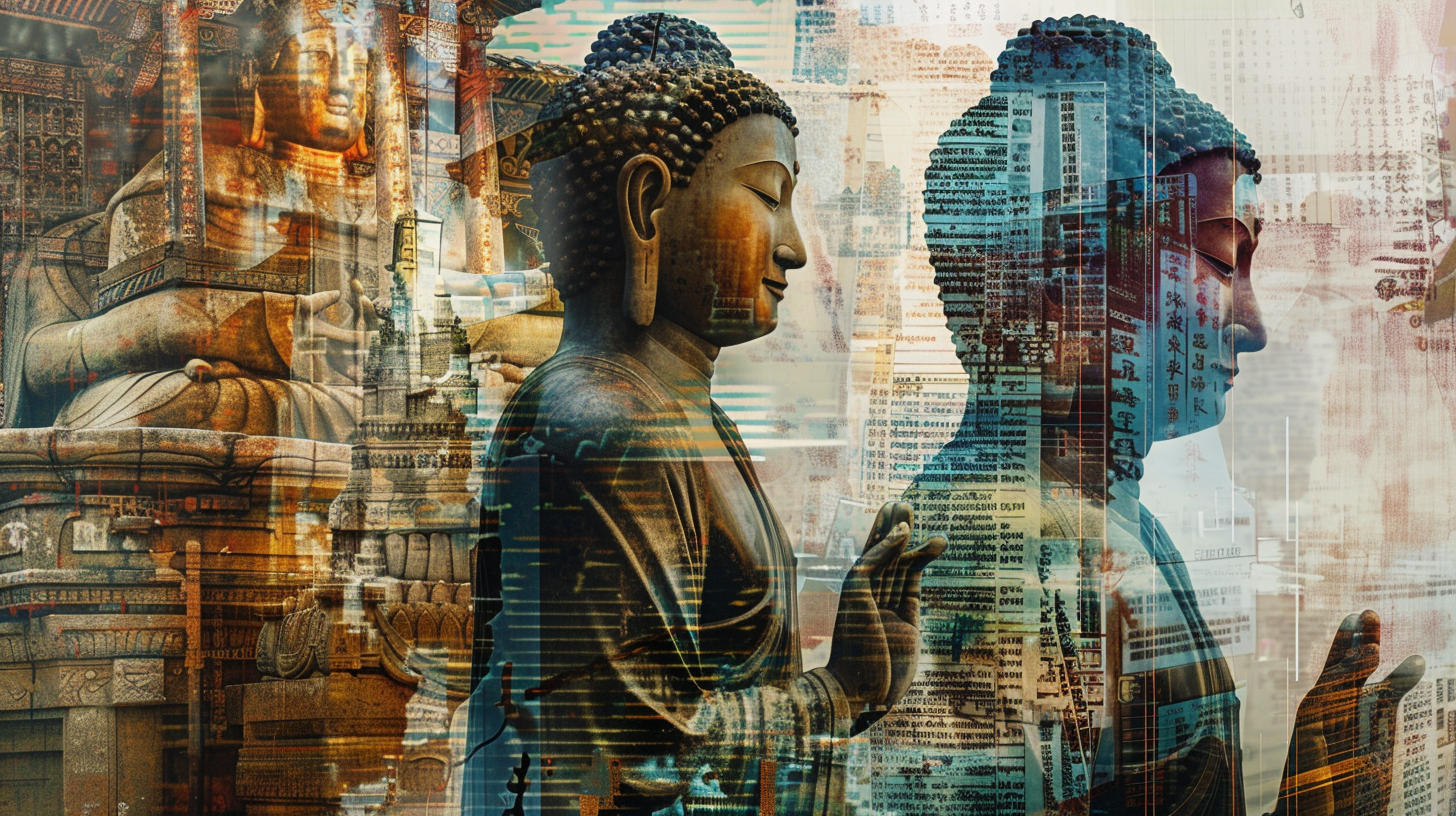Introduction

Picture yourself as a curious explorer at the edge of a vast landscape of knowledge and wisdom. Before you stretch a path less trodden, winding through realms of profound insight and transformative truths. This is no ordinary journey—it’s a pilgrimage of the mind and spirit, and you, my fellow seeker, are invited to embark on this quest where enlightenment and higher consciousness await.
Have you ever stood under the vast expanse of the starlit sky and felt a deep, almost unspeakable urge to understand more than what the eye sees or the mind comprehends? This universal quest for deeper understanding and inner peace is not just an idle wanderlust of the mind; it is the very essence of what it means to be fully human.
Enlightenment and higher consciousness are not relics of ancient philosophy, dusted with the sands of time and irrelevant to our modern lives. On the contrary, they are beacons that guide us to a deeper, more fulfilling existence, illuminating paths through the everyday noise and haste. In this guide, “The Ultimate Guide to Achieving Enlightenment: Exploring Higher Consciousness Through Books,” you will discover not only the philosophical underpinnings of these timeless pursuits but also practical, actionable ways to weave their insights into the fabric of your daily life.
You can expect comprehensive reviews of transformative books—each a gateway to new dimensions of understanding and practical tips that will help you integrate these profound teachings into your everyday actions and decisions. Whether you are a seasoned meditator or a curious novice to the spiritual path, the journey mapped out in these pages is designed to resonate with and enrich your personal quest for knowledge.
So, are you ready to turn the page and step into a broader consciousness? Let this journey transform not just how you think, but how you live and interact with the world around you. Engage with each word, each idea, as a step closer to the enlightenment you seek. This is your moment to embrace the adventure of a lifetime.
Understanding Enlightenment and Higher Consciousness

Step into the vast and varied landscape of enlightenment and higher consciousness, where ancient wisdom meets modern curiosity. Your goal in this section is to unravel the complex ideas of enlightenment and higher consciousness for you, making these concepts both accessible and compelling. Let’s start by defining enlightenment and higher consciousness, referencing their origins in different historical and cultural contexts.
Enlightenment, often seen as the pinnacle of spiritual achievement, is commonly understood as a state of complete insight into the ultimate nature of our minds and the universe. Historically, this concept has roots in various traditions, from the Buddha’s enlightenment under the Bodhi tree, which marked the birth of Buddhism, to the mystical interpretations of enlightenment in Western philosophies. Higher consciousness similarly involves transcending our normal state of being, achieving a heightened sense of awareness and a connection to something greater than oneself.
These ideas have evolved over centuries and are interpreted differently across philosophical and spiritual traditions. In Hinduism, enlightenment is linked to the concept of moksha, liberation from the cycle of birth and rebirth, while in Western esotericism, it might be more about intellectual enlightenment or the illumination of the mind and soul.
Next, let’s address the contemporary pursuit of these states of being. In today’s fast-paced, tech-driven world, you might wonder why the quest for higher consciousness is more relevant than ever. The answer lies in the very challenges presented by modern life—stress, information overload, and a pervasive sense of disconnection. Modern seekers are turning to these ancient teachings as tools to regain balance and perspective. Integrating practices like meditation, mindfulness, and conscious living into daily routines is not just a trend but a necessity for mental and spiritual well-being.
The benefits of pursuing higher consciousness are profound and multifaceted. Psychologically, it equips you with the tools to manage stress and anxiety more effectively, fostering a state of mental clarity and peace. Spiritually, it offers a sense of connectedness, bringing about a deep-seated empathy and compassion towards others. Physically, the practices associated with seeking higher consciousness, such as yoga and meditation, can improve everything from cardiovascular health to brain function.
By embracing these practices, you embark on a journey of personal transformation that can lead to a more fulfilled and purposeful life. This is not just about personal gain; it’s about transforming the way you interact with the world, enhancing your relationships, and contributing to a more compassionate society.
Key Philosophies and Theorists: Foundations of Enlightenment and Higher Consciousness

As you continue on this enlightening journey, your next step is to delve into the philosophical foundations that form the bedrock of higher consciousness and enlightenment. This exploration aims to elucidate the major philosophical underpinnings that discuss higher consciousness, with a focused lens on seminal traditions such as Buddhism and Advaita.
Major Philosophical Underpinnings
Let’s begin by summarizing these key philosophies, explaining their core principles and how they conceptualize enlightenment and higher consciousness. Buddhism, as articulated by Siddhartha Gautama—the Buddha—centres on the realization of the Four Noble Truths and the practice of the Eightfold Path. This path guides you toward the cessation of suffering and the achievement of nirvana, defining enlightenment as the profound understanding and detachment from worldly desires and suffering.
Advaita Vedanta, a school within Hindu philosophy, teaches the principle of non-duality. This philosophy posits that the individual self and the universal self are one and the same, a realization that dissolves the illusion of separateness and leads to moksha or liberation from the cycle of birth and rebirth. Here, enlightenment is understood as self-realization and the direct experience of oneness with the entire universe.
Influential Thinkers and Authors
Next, shift your focus to some of the most influential thinkers and authors in the realm of spiritual enlightenment. Figures like the Buddha and Shankaracharya stand out as monumental pillars whose teachings have transcended time and cultural boundaries. The Buddha’s teachings not only spawned a religion but also offered a practical methodology for understanding the mind and alleviating human suffering. Shankaracharya, revered in the Advaita Vedanta tradition, systematized and revitalized Hindu philosophy through his profound commentaries and texts, making the complex teachings accessible and applicable.
In more recent times, modern authors like Eckhart Tolle and Ram Dass have distilled these ancient wisdoms into accessible teachings for contemporary audiences. Their works bridge the gap between eastern spiritual traditions and western existential queries, demonstrating how these ancient philosophies can be applied in the contexts of modern life challenges.
Practical Applications and Personal Connection
These teachings are not just academic; they are profoundly practical, offering insights that you can apply in your pursuit of a deeper, more enlightened state of being. For instance, mindfulness—a core practice from Buddhism—can be integrated into daily activities, helping you cultivate a moment-to-moment awareness and presence. Similarly, the non-dualistic approach of Advaita encourages you to see beyond superficial distinctions, fostering a sense of unity with all that exists.
Mastering Life's Flow: Deepak Chopra's Essential Guide to 'The Seven Spiritual Laws of Success
Top Books on Higher Consciousness and Their Impact

As you explore deeper into the exploration of enlightenment and higher consciousness, this section invites you to discover the transformative power of literature on this profound journey. Let us explore 5-7 essential books that have significantly guided seekers toward enlightenment, discussing the core teachings and practical applications of each. These books encompass a range of perspectives and traditions, providing a comprehensive look at the diverse paths to higher consciousness.
Book Reviews: Pathways to Enlightenment
1. “The Power of Now” by Eckhart Tolle
Main Theme & Author Background: Eckhart Tolle introduces the concept of “living in the now” as a pathway to achieving spiritual enlightenment. Born in Germany and later moving to Canada, Tolle’s transformational experiences led him to write this influential book.
Key Concepts: Tolle emphasizes the importance of present moment awareness, explaining how past and future are mental constructs that distract from true spiritual awakening.
Real-Life Impact: Many readers have reported profound changes in stress levels and life satisfaction, illustrating the book’s ability to make spiritual concepts accessible and actionable.
2. “Autobiography of a Yogi” by Paramahansa Yogananda
Main Theme & Author Background: This book introduces the teachings of Kriya Yoga and Yogananda’s spiritual journey from India to the West. Yogananda is a key figure in bringing Eastern spirituality to Western audiences.
Key Concepts: It covers the life-changing encounters with spiritual figures in India and the profound teachings of Kriya Yoga.
Real-Life Impact: Testimonials often speak of an increased sense of peace and a new-found approach to spirituality after reading this book.
3. “Be Here Now” by Ram Dass
Main Theme & Author Background: Ram Dass, an influential spiritual teacher and a former Harvard psychologist, writes about his transformational journey through India and his encounters with his guru, Maharaj-ji.
Key Concepts: The book focuses on the importance of yoga and meditation in daily life and the power of living in the present.
Real-Life Impact: Readers have described life transformations that involve adopting new spiritual practices and a deeper understanding of their personal spiritual path.
4. “The Seven Spiritual Laws of Success” by Deepak Chopra
Main Theme & Author Background: Deepak Chopra blends physics and philosophy to outline the spiritual aspects of success. Chopra, an Indian-American author and speaker, is known for his work in the field of mind-body medicine.
Key Concepts: This book distills the essence of Chopra’s teachings on the interconnections between success and spiritual laws of the universe.
Real-Life Impact: Case studies often highlight the practical application of these laws in business and personal development.
5. “A New Earth: Awakening to Your Life’s Purpose” by Eckhart Tolle
Main Theme & Author Background: A continuation of the themes in “The Power of Now,” this book delves deeper into the ego, personal pain, and the pathway to personal and global transformation.
Key Concepts: Tolle discusses how transcending our ego-based state of consciousness is essential to personal happiness and the key to ending conflict and suffering throughout the world.
Real-Life Impact: Individuals share stories of overcoming personal challenges and conflicts by applying the teachings of this book, fostering a global sense of community and peace.
Unlocking Destiny: Key Quotes and Transformative Lessons from 'The Alchemist
Practical Techniques and Integrations

As you transition from understanding the theoretical aspects of higher consciousness to applying these concepts in real life, this section is dedicated to transforming theory into practice. Your journey toward enlightenment is not confined to intellectual understanding alone; it also demands practical application. Here, we guide you through practical techniques and daily practices that integrate the lessons from the influential books discussed earlier. These practices are aimed at cultivating mindfulness, enhancing meditation experiences, and encouraging reflective journaling.
Daily Practices to Cultivate Mindfulness and Meditation
Begin by outlining specific daily practices that can be seamlessly incorporated into your routine. For example, consider the importance and impact of starting the day with meditation, using techniques from books like Eckhart Tolle’s The Power of Now. Meditation upon waking helps set a tone of mindfulness that can carry through the day, reducing stress and enhancing your focus.
Moreover, mindfulness can be practiced even during mundane activities like eating or commuting. Draw on examples from Thich Nhat Hanh’s teachings to illustrate these methods. For instance, while eating, you could focus intensely on the taste and texture of the food, appreciating the moment and the nourishment it provides, turning a simple meal into a profound exercise in mindfulness.
The Power of Reflective Journaling
Next, explore the power of reflective journaling as a tool for personal growth. Maintaining a spiritual journal allows you to track your thoughts, emotions, and spiritual experiences over time. Include prompts that encourage deep self-reflection, such as “What moments today made me feel closer to my inner self?” or “How did I handle moments of stress in alignment with my spiritual beliefs?” This kind of writing helps you understand your progress on the path to enlightenment and identify areas needing attention.
Engaging with Communities
In addition to individual practices, engage with communities and online forums that focus on spiritual growth and higher consciousness. The benefits of such engagements include gaining diverse perspectives, finding support during challenging times, and sharing insights and experiences. Provide examples of active online communities, discussion forums, or social media groups where you can find like-minded individuals. For instance, platforms like Reddit and Insight Timer offer spaces for discussion and connection with others on similar spiritual paths.
Challenges on the Path to Enlightenment

As you journey deeper into your quest for enlightenment and higher consciousness, it’s crucial to recognize and navigate the inevitable challenges that arise. This section is dedicated to uncovering common obstacles you might encounter and providing practical guidance on how to overcome them.
Identifying Common Obstacles
The path to higher consciousness is seldom smooth and is often riddled with challenges that can test your resolve. Among the most common obstacles are maintaining consistency in practice, overcoming skepticism—both internal and external—and managing the frustration that can come from perceived slow progress. These challenges often stem from misconceptions about enlightenment, such as expecting instant results or underestimating the depth of commitment required. Understanding these issues is the first step toward overcoming them.
Practical Guidance on Navigating Challenges
To effectively navigate these challenges, consider the following strategies:
Setting Realistic Goals: Define clear, achievable goals to guide your practice and keep you motivated. Break down your larger goal of enlightenment into smaller, manageable steps that feel less daunting and more attainable.
Finding a Mentor or Community: Seek out individuals or groups who share your spiritual goals. A mentor who is further along the path can provide invaluable guidance and reassurance, while a supportive community can offer encouragement and a sense of shared journey.
Embracing the Journey: View your path to enlightenment as a continuous learning process, not a destination. This perspective helps mitigate frustration and keeps you open to the lessons each day brings.
Dealing with Skepticism
Dealing with skepticism requires cultivating a supportive environment:
Internal Support: Develop self-compassion to quiet inner doubts. Remind yourself that progress in spiritual practices is often subtle and cumulative.
External Support: Engage with like-minded individuals through online forums, local meditation groups, or spiritual retreats. Sharing your experiences and challenges can reinforce your commitment and enrich your journey with diverse perspectives.
The Future of Enlightenment Studies

As you reflect on the timeless journey toward enlightenment, it’s crucial to look ahead and consider what the future holds for the study of consciousness. This section explores the emerging trends, including the exciting interdisciplinary approaches and technological advancements that are shaping this evolving field.
Emerging Trends in the Study of Consciousness
The quest to understand consciousness is advancing rapidly, with cutting-edge research from fields as diverse as neuroscience, psychology, and even quantum physics. These disciplines are converging to deepen our understanding of consciousness and its myriad manifestations. For instance, neurofeedback technology is being leveraged to provide real-time insights into brain activity, allowing individuals to develop greater control over their mental states, thus enhancing meditation and mindfulness practices. Additionally, augmented reality meditation aids are being developed to help users visualize and achieve deeper states of relaxation and awareness.
Interdisciplinary Approaches and Technological Innovations
At the intersection of technology, art, and spirituality, new interdisciplinary approaches are emerging that not only enrich our understanding of enlightenment but also make these ancient practices more accessible. Virtual reality, for example, is being used to simulate meditative experiences that can transport users to serene, sacred spaces designed to facilitate deep meditation. Furthermore, applications integrating artificial intelligence are offering personalized spiritual guidance, adapting to the individual’s emotional and spiritual needs to provide tailored advice and exercises.
Encouraging Continued Exploration and Lifelong Learning
As we venture into these new territories of knowledge and experience, it’s important for you, the seeker, to continue your journey of discovery and learning. Stay curious and open to the new ideas, techniques, and technologies that can aid in your pursuit of higher consciousness. Engage actively in both online and offline communities that are at the forefront of these developments. These communities provide not only support and encouragement but also a platform for exchanging ideas that could lead to the next big breakthrough in our understanding of the self and the universe.
Conclusion: Embracing Your Path to Enlightenment

As we reach the conclusion of this comprehensive exploration into the realms of enlightenment and higher consciousness through literature, it’s important to encapsulate the transformative journey we’ve embarked upon together. This exploration has not only offered a glimpse into the profound depths of spiritual wisdom but has also equipped you with practical tools and insights that can significantly impact your life.
Throughout this article, we’ve delved into the transformative power of various books that do more than just impart knowledge—they provide practical tools and spiritual guidance. From understanding the philosophical underpinnings of higher consciousness to integrating these teachings into daily practices, and overcoming the inevitable challenges along the way, each step has been a building block towards a deeper, more meaningful existence.
Now, I encourage you to take the next step on your journey toward enlightenment. Whether you are just beginning or seeking to deepen your path, consider starting with one of the books reviewed. Each book offers a gateway to deeper understanding and personal growth, equipped with the potential to transform your approach to life and spirituality.
I urge you to make a personal commitment to continual learning and exploration. Engage with the ideas and practices that resonate with you. Connect with communities that share your quest for deeper understanding, participate in discussions, and apply the tools discussed here to navigate your spiritual path. Remember, the journey towards higher consciousness is a shared experience, enriched by the diverse perspectives and insights of fellow seekers.
Let this conclusion serve not just as the end of an article but as a launching pad for your continued spiritual journey. You have the capability to attain higher consciousness and to live a life of profound depth and meaning. Embrace this journey with confidence, curiosity, and a determined spirit to explore the various layers of consciousness that define our existence.
This is your path, unique and full of potential. Walk it with openness, courage, and an eager heart, ready to discover the endless possibilities that await.







